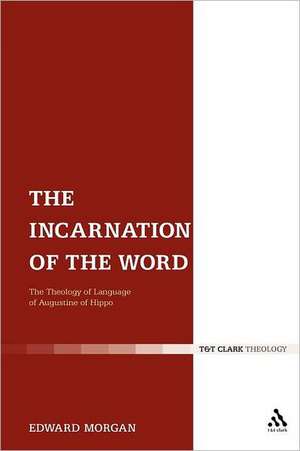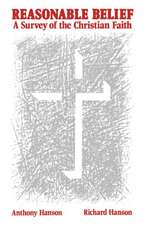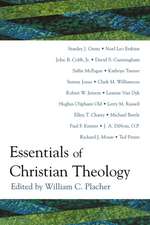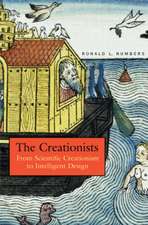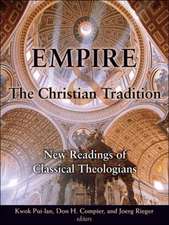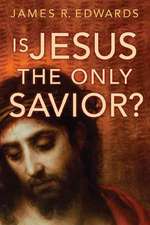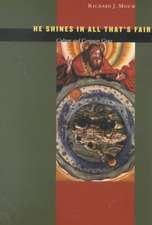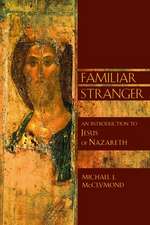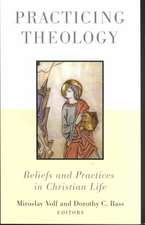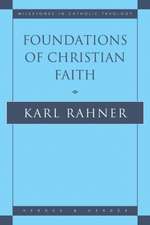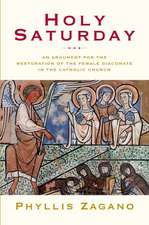The Incarnation of the Word: The Theology of Language of Augustine of Hippo
Autor Dr Edward Morganen Limba Engleză Paperback – 19 oct 2011
| Toate formatele și edițiile | Preț | Express |
|---|---|---|
| Paperback (1) | 262.62 lei 6-8 săpt. | |
| Bloomsbury Publishing – 19 oct 2011 | 262.62 lei 6-8 săpt. | |
| Hardback (1) | 889.63 lei 6-8 săpt. | |
| Bloomsbury Publishing – 31 mar 2010 | 889.63 lei 6-8 săpt. |
Preț: 262.62 lei
Preț vechi: 338.89 lei
-23% Nou
Puncte Express: 394
Preț estimativ în valută:
50.25€ • 51.84$ • 41.94£
50.25€ • 51.84$ • 41.94£
Carte tipărită la comandă
Livrare economică 26 martie-09 aprilie
Preluare comenzi: 021 569.72.76
Specificații
ISBN-13: 9780567635716
ISBN-10: 0567635716
Pagini: 208
Dimensiuni: 156 x 234 x 11 mm
Greutate: 0.29 kg
Editura: Bloomsbury Publishing
Colecția T&T Clark
Locul publicării:London, United Kingdom
ISBN-10: 0567635716
Pagini: 208
Dimensiuni: 156 x 234 x 11 mm
Greutate: 0.29 kg
Editura: Bloomsbury Publishing
Colecția T&T Clark
Locul publicării:London, United Kingdom
Caracteristici
Augustine
is
a
pivotal
figure
in
theology.
This
study
promises
a
large
potential
readership.
Notă biografică
Edward
Morgan
(MPhil.,
PhD.
(Cantab.))
is
Research
Associate
at
the
Centre
for
Early
Christian
Studies,
Australian
Catholic
University;
and
tutor
in
philosophy
at
the
same
institution.
Cuprins
IntroductionChapter
1
-
The
problem
of
language
in
the
De
Trinitate1.1
Beginning
at
the
end:
the
significance
of
Book
15
of
the
De
Trinitate1.2
God
and
the
ultimate
difference
between
creation
and
Creator1.3
The
Incarnation
of
the
Word:
the
analogy
between
divine
and
human
speech1.4
Language
in
the
De
Trinitate:
the
tool
of
transformation
and
its
relationship
to
the
mindChapter
2
-
De
Doctrina
Christiana
Book
1:
God,
speech
and
ethics2.1
De
Doctrina
Christiana
Preface
and
Book
1:
the
mechanics
of
theological
speechian
mind.2.2
Things
and
signs:
the
possibility
of
speech
about
God2.3
Speech
theory
continued:
the
Word
becomes
flesh2.4
Uti/frui:
use,
enjoyment
and
sociality
articulated
2.5
Conclusion
Chapter
3
-
De
Doctrina
Christiana
Books
2
and
3:
Learning
to
Read
3.1
Scripture
and
the
task
of
'self-reading':
the
transformative
capacity
of
the
written
word3.2.
Signs
and
things:
words
and
their
relationship
to
thought3.3.
The
pathway
to
wisdom:
seven
steps
to
God
3.4
Signs
and
things:
meaning,
interpretation
and
eschatology3.5
Cupiditas
and
caritas:
a
transformative
dialogue3.6.
Cupiditas:
the
problem
to
be
resolved3.7.
Caritas
and
cupiditas:
the
continuity
between
inner
and
outer
Augustinian
being
3.8:
Conclusion
Chapter
4
-
De
Doctrina
Christiana
Book
4:
The
Importance
and
Character
of
Public
Speech
4.1
Form
and
content:
Augustinian
theological
anthropology4.2.
Community
and
text:
the
priority
of
the
spoken
word4.3
Speech
and
Christian
community:
a
dialogical
relationship
Chapter
5
-
Confessions:
Sociality,
speech
and
Christian
identity5.1.
Confessional
identity:
the
meaning
of
a
text5.2
The
Manichees
and
Ambrose:
a
search
for
linguistic
resolution
Recenzii
Morgan's
writing
is
lucid;
his
arguments
clear,
succinct,
and
persuasive.
His
intended
audience
is
already
familiar
with
Augustine's
works
under
investigation...
theologians
reflecting
on
the
theology
of
language
will
find
this
monograph
useful.
Recommended
for
seminary
and
major
university
libraries.
